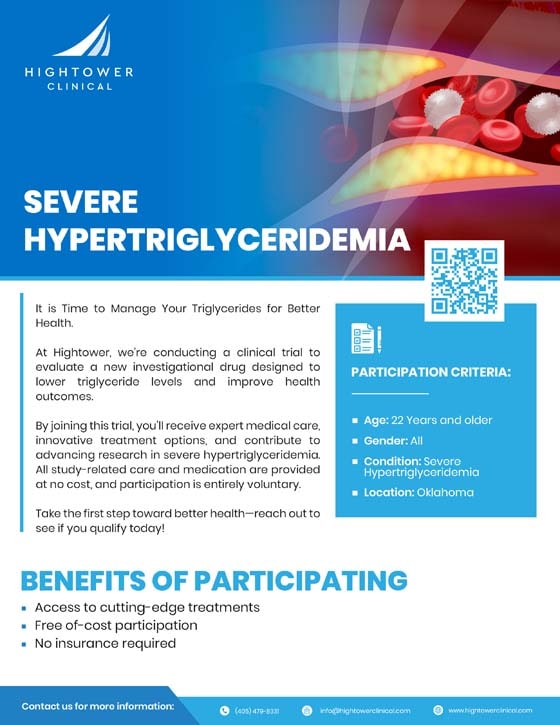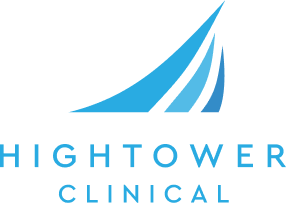Severe hypertriglyceridemia is typically caused by a combination of genetic and lifestyle factors. Inherited lipid metabolism disorders, such as familial hypertriglyceridemia, are a common cause. Lifestyle factors, including a diet high in fats and sugars, obesity, and excessive alcohol consumption, can also contribute.
Severe Hypertriglyceridemia Clinical Trials in Oklahoma City, OK
Participate in clinical trials on hypertriglyceridemia to help improve health outcomes.
Enroll Now
Are You Living with Severe Hypertriglyceridemia?
You may be eligible for severe hypertriglyceridemia clinical trials in Oklahoma City, OK
Severe hypertriglyceridemia is a significant health concern that can lead to serious complications, including pancreatitis and cardiovascular disease. Despite advancements in treatment options, there remains a critical need for innovative therapies to effectively manage this condition.
At Hightower, we are currently conducting clinical trials focused on severe hypertriglyceridemia to evaluate the safety and efficacy of an experimental drug. Your participation could play a crucial role in advancing treatment options for this condition.
Joining the clinical trial is completely voluntary and at no cost to you.
If you’re interested in participating, kindly complete the provided form. A member of our research team will reach out to discuss your eligibility and provide further details about what participation involves.
Hypertriglyceridemia
| Study Name | Protocol Number | Sponsor |
|---|---|---|
| ENTRUST | 89bio, Inc. |
About Severe Hypertriglyceridemia Clinical Trials
In collaboration with pharmaceutical companies, Hightower is conducting a research study on severe hypertriglyceridemia to evaluate the safety and efficacy of an investigational medication for individuals affected by this condition.
This Phase 3 clinical trial aims to determine whether the investigational drug can effectively reduce triglyceride levels and mitigate the risk of associated complications.
Participants will be randomly placed into one of two groups: one will receive the investigational drug, while the other will receive a placebo.
All study procedures and related treatments, including the investigational drug, are provided at no cost, and insurance is not required for participation.
The study doctor will guide you through each step of the clinical trial before you decide to participate and will address any questions you may have about the study treatment.
What to Expect from Clinical Trials for Severe Hypertriglyceridemia
Once you agree to participate in the study, you will be asked to sign an Informed Consent Form that provides detailed information about the study’s purpose, procedures, and potential risks and benefits. Our research team will guide you through the study process and explain your role in the trial. We encourage you to ask any questions you may have before making your decision to participate or withdraw.
After signing the consent form and addressing all your questions, participants will be randomly assigned to one of two groups: the Control group or the Experimental group.
- In the Control group, participants will receive a placebo randomly.
- In the Experimental group, participants will receive an investigational drug that contains active ingredients.
This study uses a double-blind design, ensuring that neither the researchers nor the participants know which treatment is being administered.
All study-related care is provided at no cost, and expert physicians and healthcare professionals will conduct thorough physical exams and assessments throughout the trial.


Age
22 years and older
Gender
All
Condition
Severe Hypertriglyceridemia
Current Status
Recruiting
What Happens in Severe Hypertriglyceridemia
Severe Hypertriglyceridemia occurs when triglyceride levels in the blood become extremely high, often above 500 mg/dL. This condition can lead to several serious health risks if left untreated.
Key Complications of Severe Hypertriglyceridemia:
- Pancreatitis: High triglyceride levels can trigger inflammation in the pancreas, leading to severe abdominal pain and potential organ damage.
- Cardiovascular Disease: Elevated triglycerides increase the risk of developing heart disease, including heart attacks and strokes.
- Liver Disease: Fatty deposits may accumulate in the liver, causing non-alcoholic fatty liver disease (NAFLD) and impairing liver function.
- Insulin Resistance: Severe hypertriglyceridemia is often linked to insulin resistance, which can worsen conditions like type 2 diabetes.
- Metabolic Syndrome: A combination of risk factors including high triglycerides, high blood pressure, and obesity, increasing the likelihood of heart disease and diabetes.
- Atherosclerosis: High triglyceride levels can contribute to the buildup of fatty deposits in the arteries (atherosclerosis), which can narrow or block blood flow, increasing the risk of heart disease and stroke.
- Stroke: Elevated triglycerides are linked to an increased risk of stroke, particularly when combined with other risk factors such as high blood pressure and cholesterol levels.
- Cholesterol Imbalance: High triglyceride levels can be associated with low levels of high-density lipoprotein (HDL) cholesterol, which is considered “good” cholesterol. This imbalance can further increase cardiovascular risk.
- Kidney Disease: Chronic high triglyceride levels may contribute to kidney damage over time, especially in individuals with diabetes or hypertension.
Frequently Asked Questions
What Are the Symptoms of Severe Hypertriglyceridemia?
Symptoms of severe hypertriglyceridemia can vary but often include abdominal pain, which may be linked to pancreatitis, as well as the appearance of fatty deposits under the skin (xanthomas).
What Are the Risks and Complications of Severe Hypertriglyceridemia?
Severe hypertriglyceridemia significantly raises the risk of developing acute pancreatitis, a potentially life-threatening condition. It also increases the likelihood of cardiovascular complications such as heart attacks and strokes due to its role in promoting atherosclerosis.
What Happens During a Severe Hypertriglyceridemia Clinical Trial?
In a clinical trial for severe hypertriglyceridemia, participants undergo an initial screening to assess their health and determine eligibility. Once enrolled, they are asked to sign an informed consent form detailing the trial’s procedures. Participants will be randomly assigned to receive either the investigational drug or a placebo in a double-blind trial. Regular monitoring, including blood tests, physical exams, and assessments of triglyceride levels, ensures the participant’s safety and tracks the study’s outcomes.
Why Participate in a Severe Hypertriglyceridemia Clinical Trial?
Taking part in a clinical trial can provide several potential benefits. Participants gain access to new and innovative treatments that may not yet be available to the general public. Additionally, they receive specialized care from expert physicians, with all trial-related care provided at no cost.




